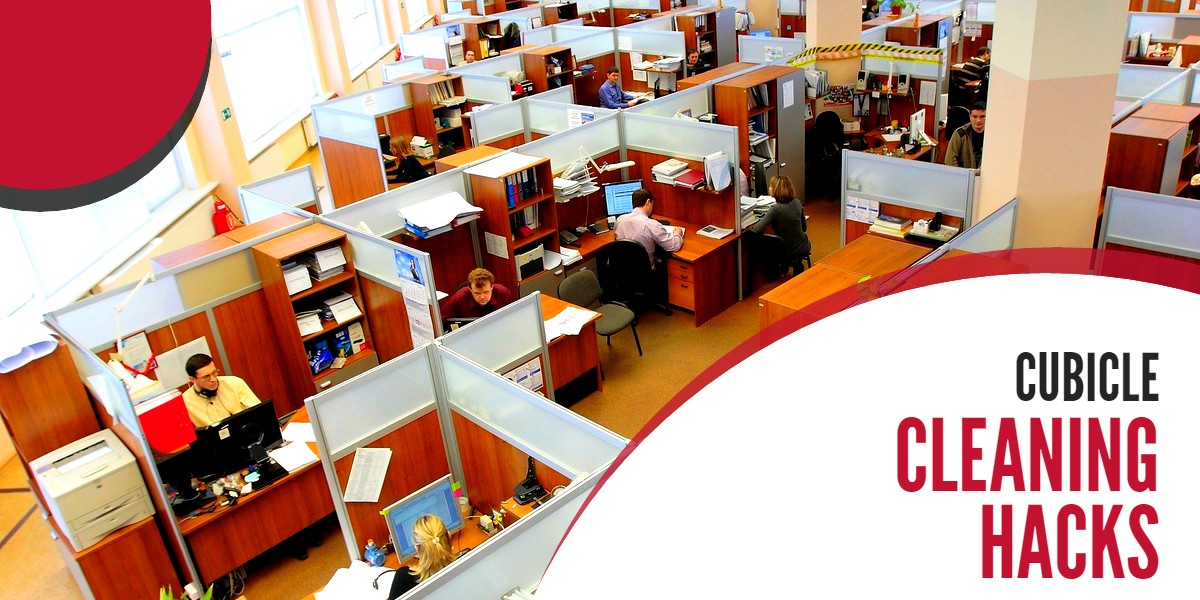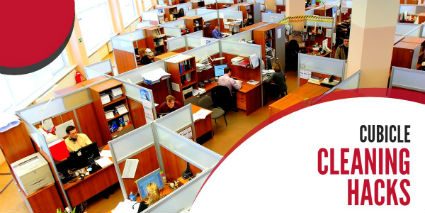Professional cleaning services tips and advice for cleaning and organizing your office cubicle.

Professional Cleaning Services Hacks for Your Office Cubicle
Working in office cubicles, especially in open office environments, can be distracting at the least and dangerous for your health in worst case scenarios.
The immediate proximity of a substantial number of people will lead to health issues.
The decreasing size of cubicles, especially for junior staff, places the employee's in the immediate vicinity of every health and personal issue of everyone near them.
Unfortunately, due to specific tax codes relating to the depreciation write-off of office furniture, cubicles are not going anywhere, anytime soon.
To combat issues common to cube-farm offices, managers will need to address several factors:
- Employee health and illness.
- Personal hygiene and other, non-health related issues.
- Workspace organization, and;
- Cleaning supply availability.
What Size has to do With It
According to a 2012 paper published by the GSA Office of Governmentwide Policy, cubicle space in American offices has decreased to as little as 40 square ft., in sustainable or minimalist workspaces, with many averaging between 60 to 75 square ft.
That is roughly 3 to 5 times the square footage of a Non-ADA bathroom stall or as little as less than twice the size of a standard ADA stall.
Adding a desk and chair reduces the occupiable space significantly.
Depending on the nature of the job function, this will likely lead to excessive clutter, which can affect employee mental wellness.
This size reduction has led many employees to compare their workspace to that of a toilet stall.
Common Issues
Small cubicles place employees within an uncomfortable proximity to trash cans, which can lead to illness or adverse respiratory reactions.
Complicating the matter; smaller cubicles are often used to maximize the number of workspaces, placing a large number of people in very close proximity.
The added stress and noise pollution contribute to distraction and poor health and work performance, often cited in cases of sick building syndrome.
Adding to the complexity is relative worker personal hygiene.
Personal hygiene, in close working conditions, can lead to minor respiratory and other reactions from something as benign as cologne or perfume, and escalate to full-blown health risks when office staff neglect to wash their hands properly or insist on eating at their desk.
In offices where personal sanitary items are in inadequate supply, workers will often bring in their own cleaning wipes and hand sterilizer.
While the attention to personal hygiene and office health is commendable, overuse of antibiotic cleaners will lead to the increase of resistant strains of illness-causing bacteria.
Best Practices
As a best practice, do the following each day:
- Clean phones, keyboards, mice, and monitors with a green cleaning solution or wipe.
- Empty all cubicle trashcans.
- Organize any paperwork and other clutter.
- Dust around desks, cabinets, and shelves.
- Vacuum in and around all cubicles.
- Clean all shared workspaces, especially break rooms, kitchens, and bathrooms.
To help prevent the spread of germs:
- Place small bottles of green hand sanitizer in each cubicle or a larger one in a central location within a cubicle group.
- Keep a ready supply of facial tissue at each desk or in a central spot.
- Make sure bathrooms are fully stocked with soap, toilet tissue, and paper towels.
- Maintain a comfortable temperature level.
- Employ a high-ceiling design or air flow system to keep the air neutral and reduce humidity.
- Make sure employees have lots of natural sunlight.
- Discourage employees from eating or storing food at their desk.
To assist with the reduction of clutter:
- Install shelving at the top of cubicles to avoid reducing the occupiable space.
- Consider switching to a paperless office setup.
- Use Binder Clips to organize computer, smartphone, and computer peripheral cables.
- Install a kitchen basket under your desk to arrange cords and keep surge protectors from getting underfoot.
- Consider implementing all-in-one computers with wireless keyboards and mice to eliminate as many wires, and save as much space as possible.
To prevent unnecessary noise pollution and distraction:
- Encourage employees to deal with their personal problems away from the cube farms.
- Train managers to avoid confrontation with employees in their cubicle.
- Discourage employees from 'popping in' to another cubicle, unannounced.
- Perform regular maintenance on older furniture to prevent squeaking.
Takeaway
Office cubicles are difficult enough to work in without the added distractions and ever-present health issues.
While tax codes may strongly favor a business's choice to employ cubicles, it is important to remember that a companies greatest asset are their employees.
A little extra money spent on organizational supplies and reducing paper use will go a long way towards conservation and reduced worker stress levels.
Remember, the more employees you have in a confined space, the more often you are going to need to have your office professionally cleaned.
If you would like to learn more about the benefits of professional cleaning services for your business, contact us today for a free quote!
In Bakersfield CA, call (661) 395-3009
In Fresno CA, call (559) 473-1790

